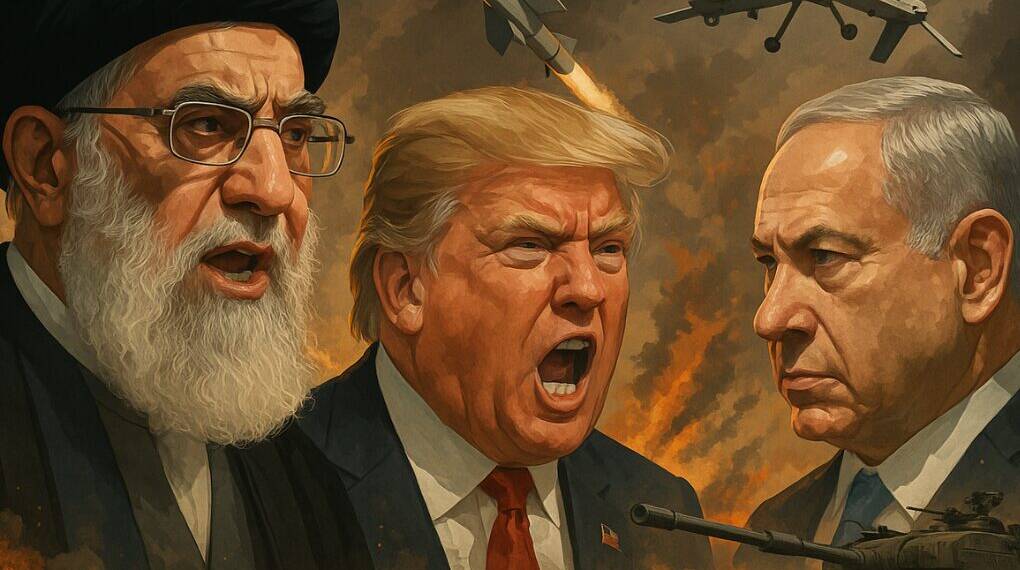In a further escalation of the ongoing Israel-Iran war, Iran’s Supreme Leader Ayatollah Ali Khamenei issued a stern warning to the United States, cautioning against military intervention. “Washington must know that we will not surrender and that any American attack will have dire and irreparable consequences,” he declared in a televised statement Wednesday. The comments mark Khamenei’s first major public intervention since the conflict began six days ago.
The war, which erupted with an Israeli aerial campaign targeting Iranian infrastructure—including nuclear and military installations—has already claimed hundreds of lives. Iran has retaliated with force, launching what it described as “Operation Honest Promise 3,” featuring Fattah1 hypersonic missiles capable of bypassing Israeli missile defense systems.
Iran’s state television reported that the Islamic Revolutionary Guard Corps (IRGC) had asserted “complete control over the skies of the occupied territories.” Meanwhile, Israel and U.S. President Trump countered with claims of full dominance over Iranian airspace — highlighting the escalating conflict and the growing involvement of global powers inching toward direct confrontation.
Khamenei’s remarks came just hours after President Donald Trump issued a provocative message on social media, demanding Iran’s “unconditional surrender” and threatening military action. Trump stopped short of ordering a strike on Khamenei but remarked chillingly, “He is an easy target… but we’re not going to take him out—at least not for now.”
In a defiant post on X, Khamenei responded, “We must give a strong response to the terrorist Zionist regime. We will show the Zionists no mercy.” The Supreme Leader’s sharp rhetoric signals a hardened stance and hints at Tehran’s readiness for further escalation.
Meanwhile, the war’s toll is growing. Israeli strikes have hit multiple Iranian sites, including the Khojir missile production facility near Tehran. Iran responded with a volley of missiles that reportedly penetrated Israeli air defenses, prompting emergency meetings among Israeli and U.S. defense leaders.
In Washington, the Trump administration appears divided. While Trump continues to rattle sabers online, reports suggest he rejected an Israeli proposal to assassinate Khamenei early in the conflict. “We don’t want missiles shot at civilians or American soldiers,” he posted, indicating a strategic restraint not always typical of his foreign policy.
Adding to the diplomatic confusion, Director of National Intelligence Tulsi Gabbard recently told Congress that there was no active Iranian nuclear weapons program. However, Trump flatly rejected her assessment, aligning instead with Israeli intelligence, which claims Iran is only weeks away from producing a nuclear bomb.
Despite conflicting intelligence, the International Atomic Energy Agency (IAEA) maintains that there is “no proof of a systematic effort” by Iran to build a nuclear weapon. However, the Fordo enrichment facility remains a major concern. Buried deep underground, it may only be vulnerable to the U.S.-made GBU-57 “bunker buster,” a weapon Israel has requested but not yet received.
As regional tensions spiral, Trump has hinted at a possible diplomatic opening, suggesting Vice President JD Vance and special envoy Steve Witkoff could be sent to Tehran. Yet his base is fractured over the direction of U.S. involvement. Prominent figures like Tucker Carlson, Marjorie Taylor Greene, and Steve Bannon have voiced strong opposition to another Middle East entanglement, urging restraint.
In response, Trump lashed out online: “Somebody please explain to kooky Tucker Carlson that, ‘IRAN CAN NOT HAVE A NUCLEAR WEAPON!’”
With the conflict now involving hypersonic weaponry, threats of assassination, and stark nuclear warnings, the Israel-Iran war teeters on the edge of broader regional—and perhaps even global—conflagration. All eyes are now on Khamenei’s upcoming televised address, expected to outline Iran’s next move as both nations brace for a prolonged and deadly confrontation.








